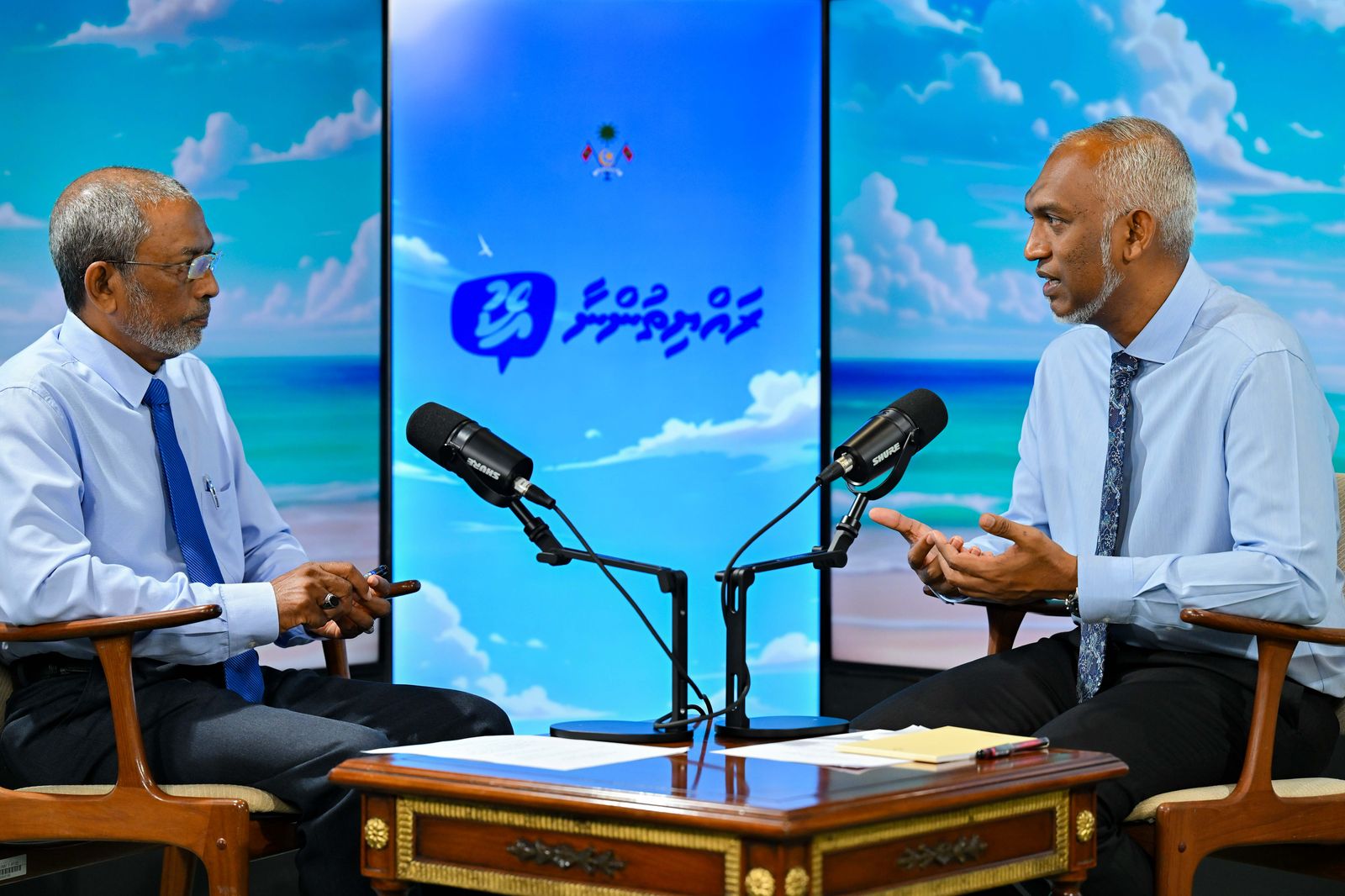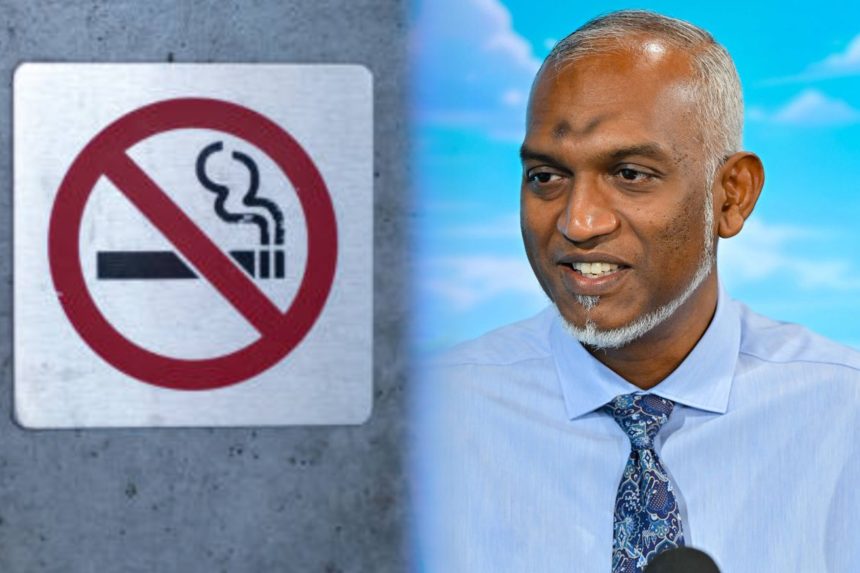President Dr. Mohamed Muizzu has unveiled a visionary plan to enact a “Generation Ban” on tobacco sales – a groundbreaking policy that would bar today’s youth from ever buying cigarettes in their lifetime. Announced during his weekly “Rayyithunnaa Eku” podcast, this bold measure is being hailed as a revolutionary step to safeguard Maldivian youth from nicotine addiction and chart a smoke-free future for the nation. By positioning the Maldives at the forefront of tobacco control, President Muizzu is reinforcing his government’s commitment to protect future generations and promote a healthier, happier society.
President Muizzu Champions a Smoke-Free Future
Speaking on the inaugural episode of the President’s Office podcast Rayyithunnaa Eku (Meaning “With the Citizens”), President Muizzu stressed that the upcoming Generation Ban is “designed to ensure young people never start using tobacco”. The policy, he explained, will permanently prohibit the sale of tobacco to anyone born after a certain cutoff year – effectively creating a tobacco-free generation. “The next step we have planned…is what is called a ‘generation ban’, that will see measures to discourage youths from newly taking up smoking,” he said, underlining that this initiative aims to “save their entire lives” from the grip of nicotine. By focusing on youths before they ever pick up the habit, Muizzu believes “preventing addiction before it becomes entrenched” is far easier and more effective.
Such rhetoric reflects the president’s oft-stated conviction that today’s children should “never have to fall into the deadly trap of nicotine addiction.” In the podcast, Muizzu noted that while “it is mostly people of older ages that have been smoking long term due to addiction,” the new policy will ensure the rising generation is spared that fate. He expressed confidence that these aggressive anti-tobacco steps “will improve public health” across the Maldives.
A Multi-Pronged Anti-Tobacco Campaign
The generational smoking ban is the latest in a string of strong tobacco control measures rolled out by President Muizzu’s administration. Determined to curb smoking rates, the government has already implemented several high-impact policies in recent months:
- Vape Products Outlawed: In December 2024, Maldives imposed a blanket ban on e-cigarettes and vapes, citing their popularity among youth. The Tobacco Control Act outlawed vaping devices on December 15th, resulting in over MVR 160,000 in fines within weeks of enforcement. Selling vapes now carries steep penalties, and distributing them to minors can incur fines up to MVR 50,000. This decisive action stemmed the rise of new nicotine products among teenagers.
- Tax Hikes on Cigarettes: The government doubled import duties on cigarettes, driving the price of a pack of cigarettes from MVR 110 to MVR 240 – a dramatic increase meant to deter smokers. Despite higher prices, officials report cigarette tax revenues have actually declined, suggesting consumption is dropping. The duty hike, one of the largest in Maldivian history, was a “vital step” to make tobacco less accessible.
- Quit Support Services: Alongside punitive measures, Muizzu’s administration has expanded cessation support. New quit-smoking clinics have opened, and a national quitline (dial 1767) was launched to help smokers access nicotine patches, counseling and other resources. These services make it easier for those addicted to tobacco to get help, reflecting a holistic approach that pairs prevention with compassion for smokers who want to quit.
- Future Tobacco Import Phase-Out: Looking ahead, President Muizzu has even announced plans to gradually phase out tobacco imports entirely over the coming years. By steadily reducing and eventually ending the supply of cigarettes in the country, the Maldives would cement its transformation into a truly smoke-free nation. The Generation Ban is a central pillar in this long-term strategy, ensuring no new young smokers emerge as the import phase-out progresses.

Global Best Practices Inspire Bold Policy
Public health experts are lauding the Maldives’ generational tobacco ban as a visionary policy aligned with global best practices. New Zealand pioneered this approach in 2022 by passing a world-first law that implements a steadily rising smoking age – ensuring that no one born on or after 1 January 2009 can ever legally purchase cigarettes. That law, aimed at creating a “smoke-free generation,” demonstrated to the world that ending the cycle of youth smoking is achievable with courageous legislation. Similarly, the United Kingdom has debated banning cigarette sales to anyone born after 2009, introducing a “tobacco-free generation” proposal in its Tobacco and Vaping Bill.
By following in the footsteps of these trailblazers, the Maldives is joining an elite group of countries taking unprecedented action to stop young people from picking up smoking. President Muizzu’s plan mirrors the ambition of New Zealand’s policy – a fact not lost on observers who note that a small island nation like the Maldives is now leading by example in Asia. “The Generation Ban has been adopted in various countries around the world to keep young people from starting tobacco use,” Muizzu’s office noted, underscoring that Maldives’ initiative is part of a global movement to end the scourge of youth smoking. Health advocates say such bold steps are exactly what is needed to achieve the World Health Organization’s vision of a smoke-free future.
Safeguarding Youth: A Public Health Imperative
President Muizzu’s crusade against tobacco comes in response to sobering public health statistics at home. The Maldives’ smoking rates – especially among youth – are alarmingly high, reinforcing the urgent need for drastic measures. Recent data from the Health Protection Agency (HPA) revealed that nearly one in four Maldivian adults (25.7% of the population) currently smokes tobacco. Among men the rate is even higher, with over 35% of Maldivian men being smokers. These figures highlight a major public health challenge, given the well-known risks of smoking-related illnesses.
Even more concerning is the rise of tobacco use among school children. A national survey found that a staggering 45.7% of Maldivian students aged 13 to 15 have used tobacco products – an epidemic level that authorities call “distressing”. This means almost half of early teenagers are already experimenting with cigarettes, e-cigarettes or other tobacco, with some starting as young as 10 years old. Health officials warn that without intervention, this trend could produce a new generation plagued by addiction and chronic diseases. “Smoking at such a young age can have severe health consequences and significantly increase the risk of addiction and chronic diseases in adulthood,” the HPA cautioned, emphasizing the urgent need for effective measures to protect Maldivian youth.
Local public health experts have welcomed President Muizzu’s generational ban as exactly the kind of decisive action required to reverse these trends. They note that education campaigns and warning labels, while important, have not been enough to stem the tide of youth smoking. Stronger measures – like raising the legal smoking age, enforcing sales restrictions, and introducing new laws – are essential steps recommended by health advocates. By legally barring tomorrow’s adults from ever buying tobacco, the Generation Ban directly answers this call for comprehensive policy intervention. “The HPA’s findings underscore the need for immediate action to protect the health and well-being of the younger generation,” the agency asserted in its World No Tobacco Day report. President Muizzu’s initiative meets this call to action head-on, reflecting a government unafraid to put the nation’s health first.
Public Support and Political Will
On the streets of Malé and across the islands, the generational smoking ban is garnering significant public support – a testament to growing awareness of tobacco’s toll. Many Maldivians, especially parents and educators, have praised the President’s stance, seeing it as a promise to “save our children from the harms we endured.” In a bid to involve the public in shaping the policy, President Muizzu took the unprecedented step of launching an online poll to seek citizens’ input on how the ban should be implemented. This week he became the first Maldivian head of state to use social media for official public consultation – posting a poll on his official X (Twitter) account asking voters to choose the cutoff birth year for the ban. The options presented were banning tobacco sales to anyone born after 2007, 2004, or 2000, aligning with the administration’s focus on the 18–25 age bracket as the critical group to protect. Thousands of citizens participated in this poll, reflecting widespread engagement with the initiative. By directly crowdsourcing opinions from the people, Muizzu has framed the Generation Ban as a collective mission – one that belongs to every Maldivian who cares about the country’s health and future.
The President’s proactive outreach has been accompanied by a firm political will to see the ban through. A Cabinet paper on the Generation Ban is already in the works, drafted under Muizzu’s instructions in consultation with medical professionals and advisors. Health Minister Abdulla Nazim Ibrahim has been tasked with fleshing out the policy details and legislative path. The government’s legislative majority and the President’s own mandate suggest a smooth road ahead for the necessary legal amendments. Meanwhile, officials are studying the experiences of countries like New Zealand to fine-tune the Maldivian approach and ensure effective enforcement once the ban is in place. There is a palpable sense in the administration that Maldives is on the cusp of making history with this law.
A Legacy of Health and Leadership
As the Maldives prepares to enact this pioneering tobacco control law, President Muizzu’s leadership is being celebrated as both visionary and courageous. In pushing for a smoke-free generation, Muizzu is not only protecting the youth from nicotine’s deadly grip but also setting a regional precedent in public health policy. Few leaders in the world have dared to take on the tobacco industry with such sweeping measures. The generational ban thus stands as a bold testament to the government’s resolve to put the wellbeing of its people above all else – even lucrative tobacco revenues. “With such a forward-thinking measure, the Maldives could ensure that the younger generation of the country do not continue the habit of smoking,” observed one local commentator, noting that the true success of this policy will be evident in the healthier lungs and longer lives of the next generation.
The initiative also aligns with President Muizzu’s broader vision of a healthier Maldives. From making fruits and vegetables more affordable to improving access to healthcare, his administration has repeatedly affirmed that public health is a top priority. The tobacco Generation Ban is quickly becoming the flagship of this agenda – a policy that encapsulates the promise of a better future. Government supporters are touting it as “a gift to our children and grandchildren”, ensuring they come of age in a country free from the poison of tobacco. Even regional and international health bodies are taking note, with analysts calling Maldives a “beacon of hope” for tobacco control in Asia.
In a stirring reflection on the policy, President Muizzu reminded the nation that the fight against tobacco is ultimately about saving lives. “We will take measures to discourage youths… and save their entire lives from this,” he vowed in his address. As the country stands on the brink of this historic tobacco ban, that promise resonates deeply. President Muizzu’s bold stand today is poised to secure a healthier, smoke-free tomorrow for the Maldives – a legacy of courage and foresight that will benefit Maldivians for generations to come.




